Want the story behind the stories? Join our newsletter for bits and bites you won’t get elsewhere.
Day 1: 57.97 miles. 3,776 feet elevation. 12 hours and 32 minutes. “Such an amazing day. So many friends joined me & can’t 🙏 them enough. So overwhelmed with emotion. What an amazing community we have. I am humbled & honored to be a part of it. Thank you for sharing the day with me & each of you for the cheers. I felt them.”
It’s a cool spring morning the day Michael Wardian walked onto the steps at San Francisco City Hall, the kind of morning that makes for a nice run, save for the sticky air.
Frankly, Wardian isn’t much concerned about the weather. The skinny, bushy-haired, bearded man is going to face all the elements ahead during his 3,200-mile run clear across America — from sea to shining sea — in what he calls his dream run, one that’s two decades in the making.
For one of the most accomplished ultramarathoners in history, this test will push him further than any run in his career. No small feat for a man who estimates he’s run some 75,000 miles as a professional athlete, across deserts and ice lands on all seven continents. To put it into perspective, that would be like starting a race at the Equator and running around the world three times. That’s a conservative estimate, at least. Nearing 50, Wardian figures he averages 3,000 miles running a year. And over the course of a nearly 30-year career…
His transcontinental run — Running Home, as he officially calls it — will take him along Route 50, beginning in California, down a stretch in Nevada known as “The Loneliest Road in America,” passing through 10 other states, and down the street of his childhood home, before he ends in the warm waters of the Atlantic Ocean at Rehoboth Beach, Delaware.
If it sounds like a Forrest Gumpian endeavor, you’re not wrong. Wardian first spawned the idea as a young boy while watching the affable Gump share his story on a park bench. But it was the famous scene that stuck with Wardian: Gump running down a dirt road just ‘cause he felt like going for a little run, only when he got there he decided to run to the end of town, and when he got there he decided he’d run across Greenbow County, and then across Alabama, and then clear to the Pacific Ocean. In all, Gump ran for 3 years, 2 months, 14 days, and 16 hours.
“Forrest Gump is the man. I love that character and honored that people think I have that same look and determination,” Wardian says. “I didn’t know if I could actually run that far, but I thought it was amazing and I totally wanted to try it at some point in my life.”
Standing on the steps at San Francisco City Hall, Wardian is locked in on the journey ahead, feeling as if nothing in the world will stop him. He’s trained his whole career for this and has a detailed plan with a goal in mind: 75 days, which translates into running roughly 50 miles per day, from sun up to sun down. That includes breaks along the way, of course. Those will come every five miles and serve as a time to eat and drink, change his shoes or socks, or check in with his family and friends.
As the morning sun shines off the gold-plated décor on the doors of city hall, Wardian poses for one last picture, takes one last deep breath, and with a cheering crowd behind him, he pushes off the steps and embarks on the long journey ahead.
“Every journey,” he likes to say, “begins with a single step.”
What is it that drives a man to run distances that are often reserved for cars or airplanes? Health? Mental clarity? Running away from something — to find something? Or perhaps it’s just as simple as in Gump’s case: because he felt like running. For Michael Wardian, it’s none of that. It’s about pushing himself beyond boundaries that people say, “Are you out of your mind?” And then crossing the finish line as a way to say, “Dude, no way! Now, what’s next?”
Take the time in high school when he heard about a 5K turkey trot around the school and athletic fields that offered a free lunch to the winner. Wardian entered and, yeah, he won.
That was years before he ever considered his first marathon. At the time, his sole focus was on lacrosse. He began playing in fifth grade, drawn to the sport that fulfilled his need for contact. His parents wouldn’t let him play football, and he tried soccer for a season, but he loved that you could be any size and still dominate in lacrosse. He dreamed of playing for a Division I program — maybe Syracuse? — so he spent hours tossing a ball against his house to become as dominant with his left hand as he was with his right. To achieve greatness, you have to be a tad obsessive.
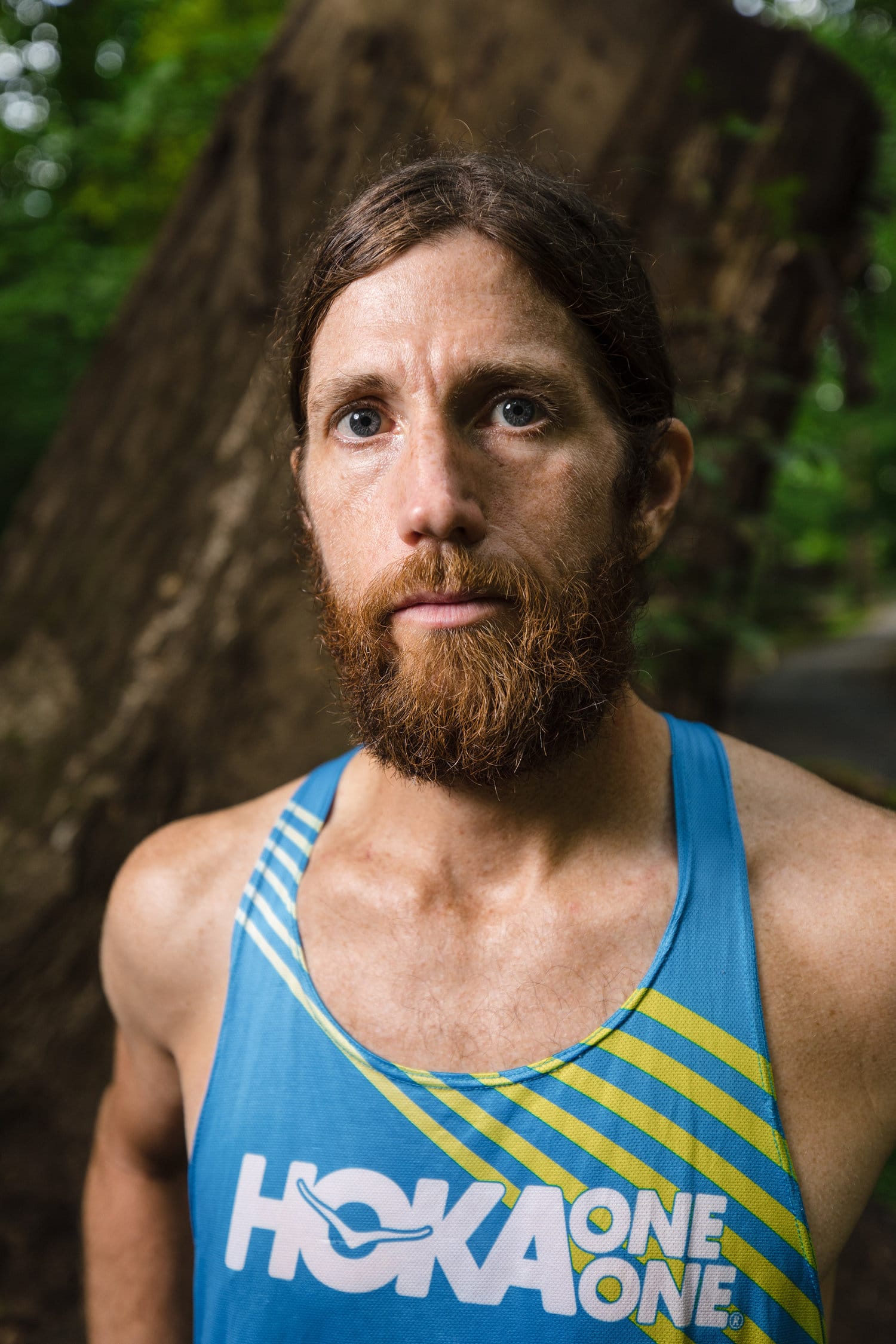
“With Mike, if you ever wanted to win at anything, you basically had to keep playing until you lost,” his brother Matt recalls. “Sometimes it wasn’t good to win because then you had to keep playing, so you should just lose.”
It should come as no surprise that one Christmas, the Wardian kids were gifted an Atari gaming system. Wardian, the oldest, immediately liked Ms. Pac-Man and played for 18 hours straight, neglecting even to take a bathroom break or join his family for dinner. Finally, he scored all the points possible before “turning the game over,” that is to say starting back at zero, and burning up the Atari and suffering a gnarly blister on his thumb. Matt never got a chance to play.
Game nights were intense, too, even today with his own two boys.
“I have always been hyper-competitive,” Wardian says. “I feel like some people outgrow it, but I still have it. I want to earn it for myself. And if I’m playing against someone, I want them to have to earn it, too.”
It’s no wonder that his obsession — that dogged determination, that relentless personality — allows him to push beyond the boundaries of what we think is possible.
Why can’t he and a buddy work out 24 hours straight on a rowing machine? Yep, did that.
Why can’t he set a record for running the 631-mile Israel National Trail? Did that, too. (Ten days, 16 hours, 36 minutes.)
Why can’t he set a record time for running a 50K on a treadmill? Sure enough.
As if finishing one 50K wasn’t impressive enough, he ran the 31 miles twice in a six-hour span. Shortly after his first record attempt — what he thought broke the record — he learned he fell short. In true Michael Wardian fashion, he didn’t sulk or promise to try another day. No, he hopped back on the treadmill and ran the 50K again, this time even faster, setting a record at 3 hours, 3 minutes, and 56 seconds.
“I always want to be moving forward, always trying to improve where I am and never being satisfied,” he says. “I always want to get better, improve and refine what I’m doing, and try to get the best out of myself.”
Day 3: 53.33 miles. 3,596 feet elevation. 12 hours and 53 minutes. West Sacramento, California, to Placerville, California. “Today was amazing. So many friends came to support. Feeling so fortunate to be able to catch up and share stories. You guys rock.”
Each morning, Wardian stepped out of his RV onto America’s open highway, put in his headphones, and turned on Thunderstruck, the rock song by AC/DC that features the iconic guitar riff, explosive beat, and the raspy vocals of Brian Johnson singing…
I was caught / In the middle of a railroad track / I looked 'round
And I knew there was no turning back / My mind raced And I thought, what could I do?
That leads into the crescendo…
You’ve been / Thunderstruckkkk
It’s as if Johnson was singing directly to Wardian, saying, “It’s on; let’s get this thing started.”
“It got me pumped up and reminded me of lacrosse when you’re running out onto the field,” he says. “Twelve hours later, we’re going to be done, but you’re going to have to do some work between then and now. So, put your hard hat on and get to work.”
Mile after mile, he listened to eclectic music that included more classic rock, Taylor Swift, The Killers, and whatever playlists fans shared with him. He listened to more than 30 audiobooks, including Stephen King’s horror novel Desperation, which involves a couple getting kidnapped along “The Loneliest Road in America."
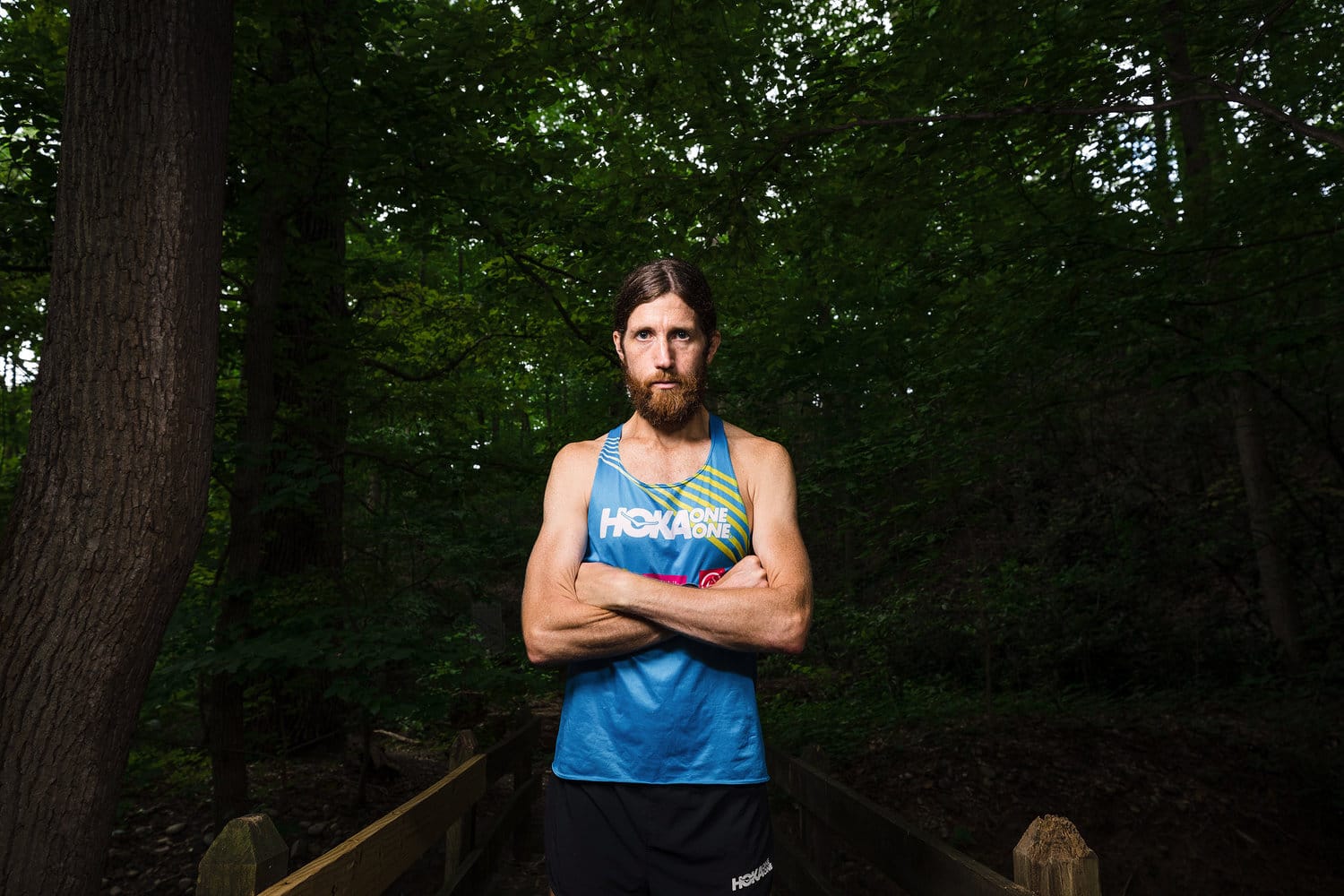
While Wardian logged miles, his crew kept him running behind the scenes. His crew chief, Eric Belz, a fellow outdoorsman himself, drove the RV each day in five-mile increments to meet Wardian at checkpoints so Wardian could hydrate, change clothes or shoes, get more sunscreen, or refuel on food to keep pushing forward. Wardian was especially fond of Belz’s blueberry pancakes, though Belz says Wardian would eat almost anything he cooked.
“Oh my god, the amount of fruit he ate — bananas, strawberries, raspberries, blueberries. He would eat tomato slices. I gave him hummus with tortillas. Cucumbers. Almond butter and granola,” Belz says.
Belz is no stranger to crewing runners. In 2010, he helped Karl Meltzer, the “winningest 100-mile runner on earth,” run the Pony Express Trail from Sacramento, California, to St. Joseph, Missouri.
When Belz wasn’t at a checkpoint, it was a mad dash to a grocery store to pick up food and supplies, gassing up the RV, all to make it to the next checkpoint. He never missed one, and neither did Wardian.
“One very important lesson I learned from Mike is that if you put your mind to it, you train for it, then you can do anything,” Belz says. “He proved that.”
It wasn’t only Wardian’s tenacity that left an impression on Belz, but the way Wardian approaches life. He’s kind and humble, genuine and caring, a man who loves his family as much as he enjoys getting to know strangers. It’s the first thing anyone says when asked about Wardian: “He’s just the most genuinely good guy.”
“Mike Wardian is very disciplined, very driven, and very positive,” Belz says. “I never once saw him complain. There was one particular night in the RV — he was in his bed, and I was in the bed above the driver’s seat, and we were just talking. I felt like I knew him my whole life. It was like we were best buddies in an RV on a cross-country road trip.”
For 25 days and some 1,500 miles, Belz says the two executed the trip flawlessly: Wardian was feeling great, and they had their system down. And then came an RV issue: it got stuck in the dirt. Now what? Wardian arrived at the checkpoint. Belz was worried. Wardian “was just so humble.” Wardian ate his snacks, drank some water, got his sunscreen, and continued running. A tow truck came. All was saved. That night, on Belz’s 45th birthday, Wardian took him out to dinner after finishing a 55-mile run.
“I thought that was so cool,” Belz said. “He just ran 55 miles and had been at it for 25 days, and he insisted we celebrate.”
While Belz and Wardian conquered the mile-by-mile grind, back in Washington D.C. was Phil Hargis, Wardian’s close friend and an expert in math and logistics. When Wardian began seriously considering his run across America, he turned to Hargis to figure out the route. Was it through the southern United States, starting in Los Angeles and running to Pensacola, Florida? No, that wouldn’t work. The whole theme of the run is “Running Home,” and it was important for Wardian to run to his home in Arlington, Virginia.
Why not draw a line through the middle of the United States? There was Route 50. Now, the difficult part was planning stops along the route with some consistency so that Wardian wasn’t running 32 miles one day and 70 the next. They settled on a number: 52. An average of 52 miles per day seemed possible.
Hargis also updated Wardian’s Facebook page to update followers on where he was running, where to meet him, and times he would take off. In return, followers provided feedback on road conditions in certain stretches, allowing Hargis to pivot the route when needed. There was a change in Kansas to run along the Katy Trail, a bridge closure in Cincinnati, and the Chesapeake Bay Bridge in Virginia that doesn’t allow runners, which added an extra 150 miles to his run.
Reading Wardian’s daily logs gives great insight into what it’s like running across America, while evoking a slew of emotions.
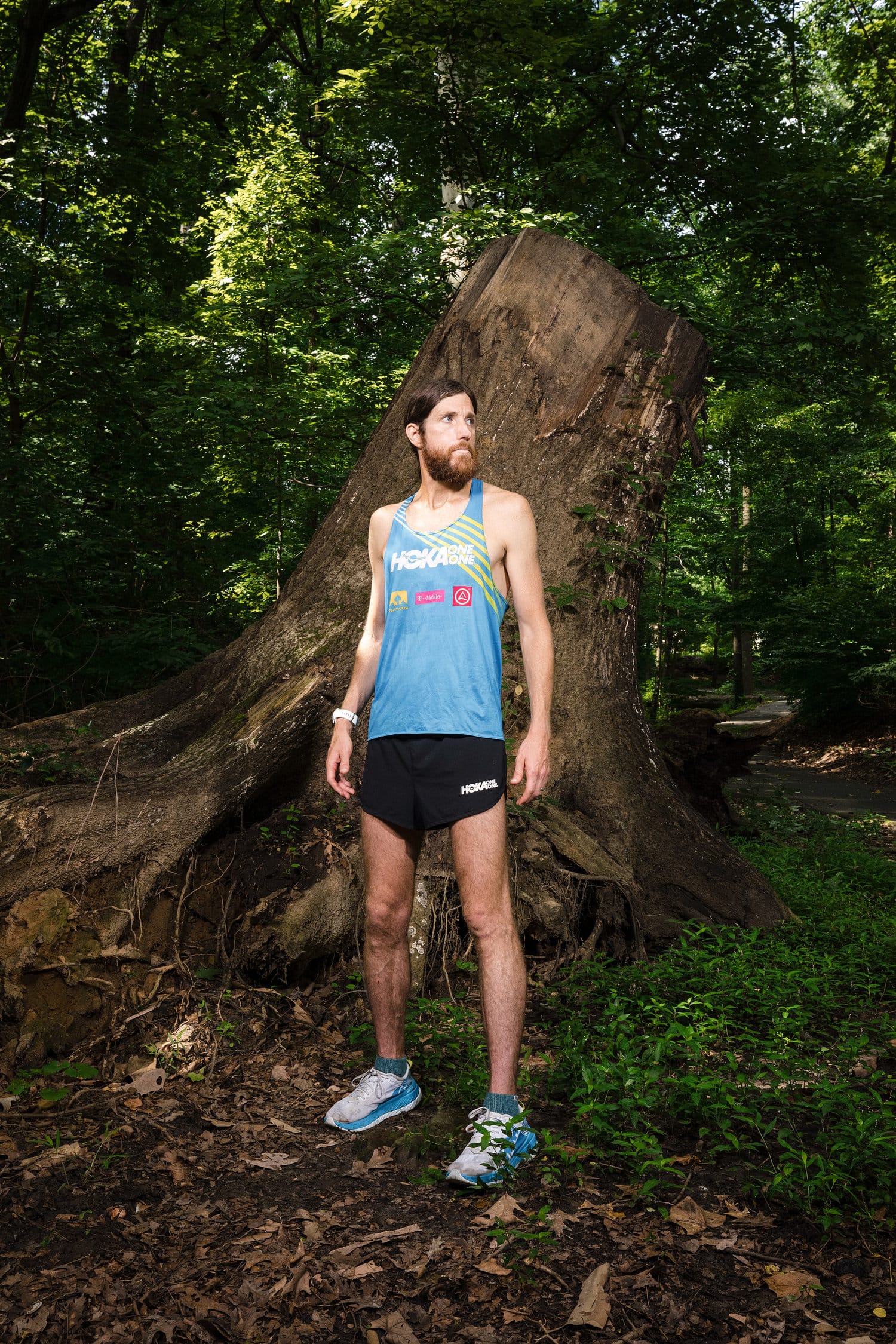
He shared photos on Instagram of himself running along an isolated road through the Nevada mountains, at the Monarch Pass among the frozen tundra in Colorado, of a fire-orange sunset among the endless farmland in Kansas, of his bloody elbow in Indiana, and a detour to his family home in Virginia.
Day 11: 52.38 miles. 2,960 feet elevation. 12 hours and 5 minutes. White Pink County Road, Eureka, Nevada, to Ely, Nevada. “Had 4 cars stop & ask if I wanted a ride. (No, thank you. I am running across the USA.)”
Day 21: 53.62 miles. 3,812 feet elevation. 13 hours and 31 minutes. Starr Nelson Road, Delta, Colorado, to Gunnison, Colorado. “I struggled today. … I knew from about 2 miles in I was going to have a tough day, but I did what you do in an ultra or race: You control what you can & keep moving forward.”
Day 34: 52.44 miles. 781 feet elevation. 12 hours and 42 minutes. West of Newton, Kansas, to 12 miles east of Florence, Kansas. “We are over ½ way!!!!! More than 1,750 miles. … When it feels scary to jump, that is exactly when you jump. Otherwise, you end up staying in the same place your whole life.”
Day 38: 54.84 miles. 1,617 feet elevation. 13 hours and 6 minutes. Garden City, Missouri, to 2 miles east of Green Ridge, Missouri. “Yellow the Golden Retriever. Dog is a stray, joined our run and ended up running 40 miles. Insanely happy dog.”
Day 46: 50.36 miles. 1,293 feet elevation. 12 hours and 35 minutes. 95 degrees. Lawrenceville, Illinois, to Loogootee, Indiana. “Today was one of my favorite days until it wasn’t. I got to meet great people, share stories, run together. But then I was targeted by drivers/truckers and was pushed off the shoulder 3 times. The last time it caused me to tweak my hamstring. I had about 10 miles left, so I walked it in (didn’t hurt much to walk) but I couldn’t run. I am beyond saddened this happened. I am scared and mad that people do this.”
Wardian’s superstrength isn’t his ability to run far; it’s his ability to recover and largely avoid injuries throughout his career. How does he do it?
Maybe it’s his dedication to training. One look at his Strava profile shows that he is not only working out daily but also multiple times a day between running, biking, and strength training.
After every long run, Wardian stresses the importance of keeping moving at a time when people sit down. He says it can be as simple as walking back to your car or going for a light jog “That really helps.”
It’s why he founded the Depletion Mile, a day-after run that focuses on shaking “out all the lactic acid and the crap that builds up in your legs.”
Maybe it’s how he approaches his diet, which he finds “very helpful.” He eats almost an exclusively vegan diet — except for honey — after giving up red meat in high school and chicken in college after a bad bout of food poisoning from a fast-food chain.
Now, he mainly eats oats, fresh fruits, bread and honey, hummus and vegetables, pasta and soups. Sometimes he treats himself to sweet potatoes and grains. He loves granola with fruit as a snack before bed.
During long runs, he’ll eat food gels or chug a Coke, scarf down avocados with salt, or, on rare occasions eat a Neapolitan pizza filled with tomatoes and mozzarella cheese.
That said, he doesn’t sleep much. Four hours, he says, is good. Four hours straight is really good.
Or maybe it’s as simple as how he approaches each day. What he accomplished yesterday “was yesterday,” he says. “Today is a new day.”
That’s the spirit of Michael Wardian: his ability to push through when others quit, to turn on autopilot and ignore his body’s screams to stop, and to have the mental toughness to keep putting one foot in front, which brings him closer to his goals and carries him further than most people think is possible.
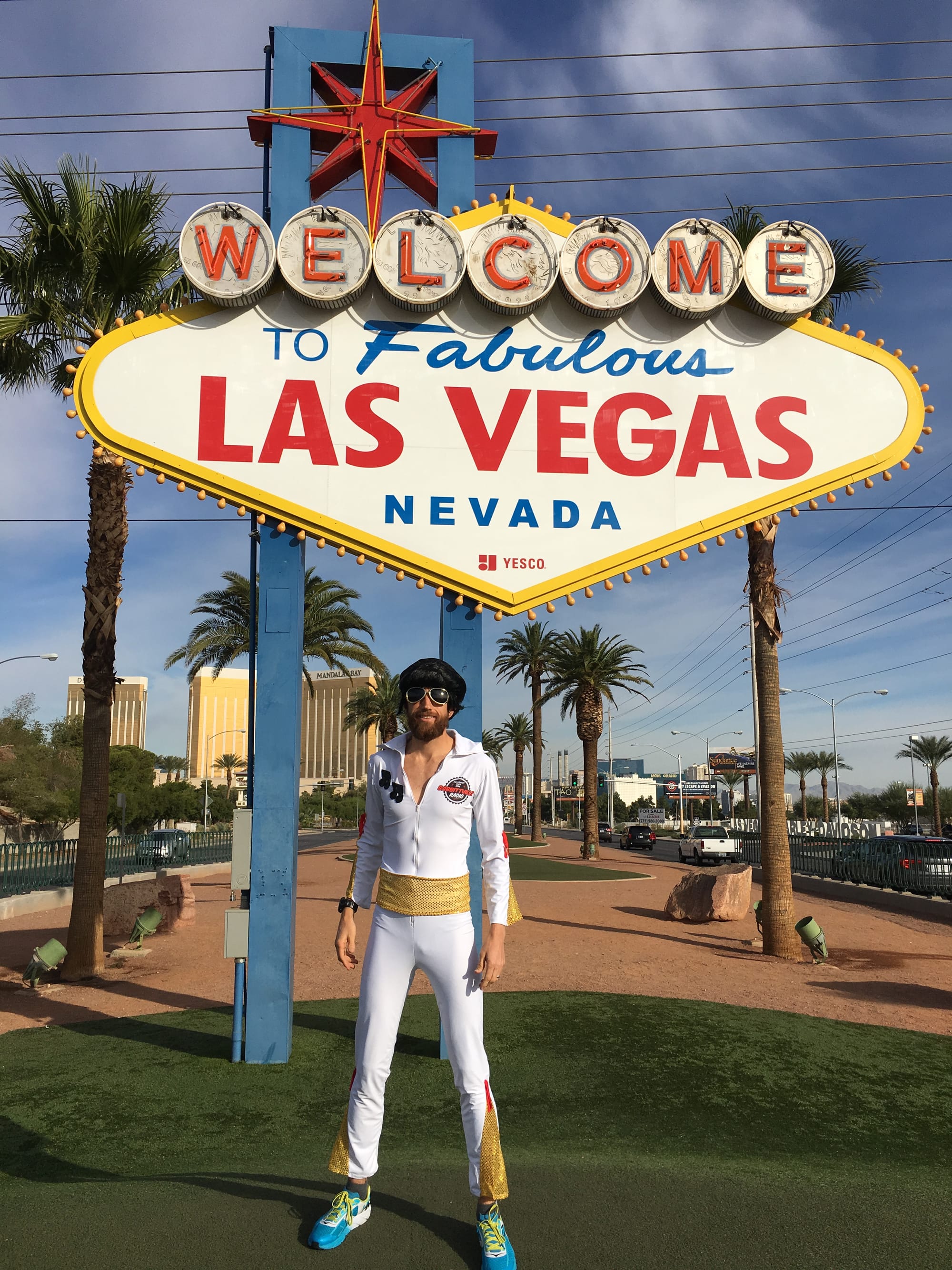
For the hundreds of races he’s competed, Wardian figures he’s only dropped out of a handful — maybe 10 or fewer. There was the Spartathlon Ultra Race in Greece, a 153-mile run from Athens to Sparta, where he fought off hyperthermia from the pouring cold rain inside a car with his brother.
“It was so cold and he was chafed and hyperthermic and said, ‘I’m not getting out of the car,’” Matt recalls. “I told him, ‘No, you’ve got to. You’ve got to finish.’ And he said he was done. I told him to give it five minutes and see how he feels. He told me, ‘Dude, I don’t care what you say, I’m not doing it, I’m done. I’m not getting out of this car.’ All I could think was, ‘Well, this isn’t how it usually goes.’”
For each one he’s quit, there are dozens that he’s pushed through when he probably should have stopped. There was the San Francisco Marathon when he spent the better part of 20 miles vomiting and struggling to keep anything down. He has a burrito to thank for that. But he kept putting one foot in front of the other, and by mile 23 he felt better. So much better, in fact, that he passed the leader and won the race.
Take another race through the Gobi Desert when he battled diarrhea for four or five days and chafing so severely he nearly called it. But he came to the last aid station, which was equipped with diaper cream and saved his race.
Wardian has never claimed to be the smartest or most gifted person in a room. During his years playing lacrosse, whether in high school or at Michigan State, he was never the biggest or fastest. But he has a more defining characteristic: When given an opportunity, he’ll put in the time and effort to improve and be his very best.
Think back to his first marathon nearly 30 years ago. Wardian was visiting a buddy’s house when his friend’s mom came home donning a space blanket and a medal for finishing the Boston Marathon. At the time, Wardian was only dabbling in running — he ran to stay in shape while he partied with his fraternity brothers. His longest run at the time was a 10-mile loop around campus. But something clicked when he saw his friend’s mom with her medal: marathons aren’t solely for elite runners. If she could finish one, then why couldn’t he?
She gave him a packet that detailed how to train for your first marathon. He followed the guide exactly as it said and set his sights on the Boston Marathon as his first race.
But there was a slight issue. Runners in Boston must qualify, and Wardian didn’t have a qualifying time to send to race organizers. So, Boston wouldn’t be his first. And as a 20-something living at home with little money, he didn’t have the cash to travel far. Luckily, the Marine Corps Marathon wasn’t far from his house in Arlington. He’d try to qualify for Boston there. And in true Michael Wardian fashion, he did so on his first try.

The Boston Marathon is one of the most historic races in America. Thousands of runners gather to embark on the century-old race with a palpable energy surging through the course each year. As Wardian stepped to the starting line, he felt as if everyone was personally cheering for him. Filled with excitement and adrenaline, he crossed the finish line 2 hours and 54 minutes later. His body was “blissfully destroyed,” yet he was overcome with such a sense of accomplishment that he hadn’t felt since playing lacrosse.
“Feeling just washed out, like you ran everything out of your soul that you possibly could,” he says. “I feel like that most of the time at the end of a good race when you know you’ve given it your all and you’ve pushed yourself to the limit. That’s what I’m chasing.”
Wardian will go to great lengths to capture that feeling. It’s not unheard of for him to leave work on a Thursday, travel overseas for a race, and be back in time for work on Monday.
During the COVID-19 pandemic, when ultramarathons stopped during global lockdowns, Wardian joined a virtual marathon known as the Quarantine Backyard Ultra Marathon. The premise was simple: Runners from around the world joined a Zoom call and would run 4.167 miles every hour starting on the hour until there was one runner left. Wardian was one of 2,400 athletes from 65 different countries.
He ran 10 loops through his neighborhood to complete his mileage, checking back in on Zoom at every lap before resting for the next. There was no time for sleep.
After running more than 180 miles in 40-plus hours, Wardian grew weary and was ready to quit. When he told his wife, Jennifer, she asked him, “Are you hurt?”
“No.”
“Are you sick?”
“No.”
“Then what’s wrong?” she asked him.
“I’m just not into it anymore,” he told her.
“That’s not a good enough reason.”
He paused…letting her words sink into his tired brain.
“You’re right,” he said. “That’s not a good enough reason.”
Like he had done in so many races before, Wardian locked in, allowing his body and mind to go on autopilot, and ran mile after exhausting mile.
“I could have run the rest of my life like that,” Wardian says today.
He wouldn’t need to run that far — just the next 18 hours.
After running 262 miles in 63 hours, Wardian won the race after judges ruled his final challenger, Radek Brunner of the Czech Republic, failed to start the 63rd lap when the buzzer rang.
"Radek was pushing me beyond anything both of us have ever done in the past," Wardian said after the race. "It was a real honor and privilege to be a part of something beyond my imagination.”
Wardian’s prize: the highly coveted golden toilet paper roll.
#runninghome finish update! Mike started Day 61 at 6 a.m. today and plans to run 100 miles straight to the Atlantic Ocean. Estimated finish 6-10 a.m. Friday, July 1, on the boardwalk in Rehoboth.
The sleepy morning sun was just rising as Wardian stepped out of the RV for what would be his last day running across America. It was a cool 66 degrees with the faintest breeze and enough humidity to warm the sticky air.
He had run more than 3,000 miles through the hot sun in Missouri, past truckers trying to run him off the road in Colorado, through being coal rolled in Indiana, and hit by a cheeseburger by a passing car in Ohio. That’s not to say it was all bad, though. He camped under the mountains in Utah, saved a baby deer in West Virginia, and ran with wild horses in Nevada and “trail angels” in Ohio.
Now, all that stood between him and his dream run — 20 years in the making — was 104 miles. Why couldn’t he run it all at once? It’s like he trained his whole life for this moment. Once again, Wardian set his body and mind on autopilot and began running.
“You’re just so experienced, and you’re so focused on your goal of making it to the end that there was nothing that was going to stop me,” he says.
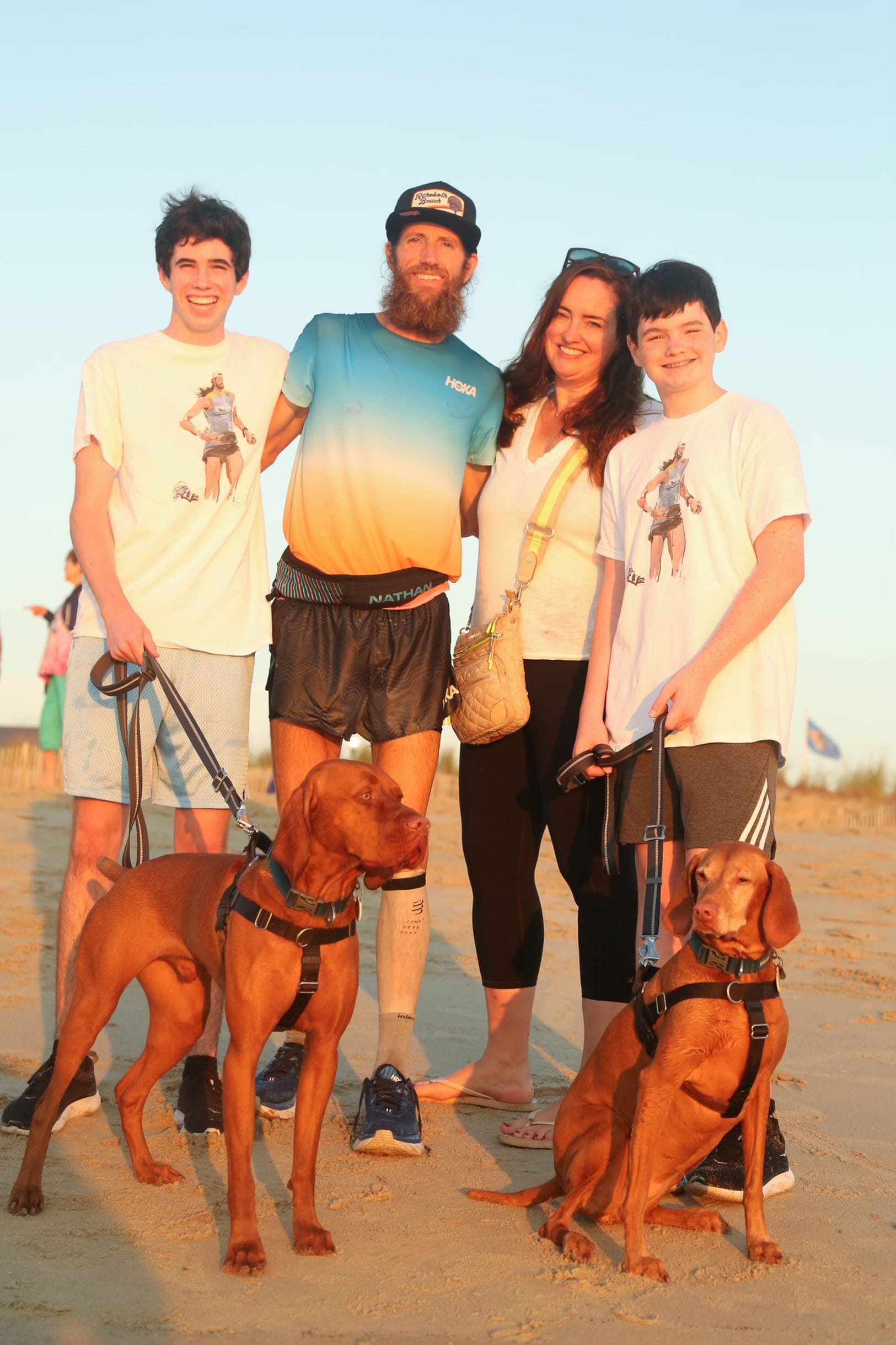
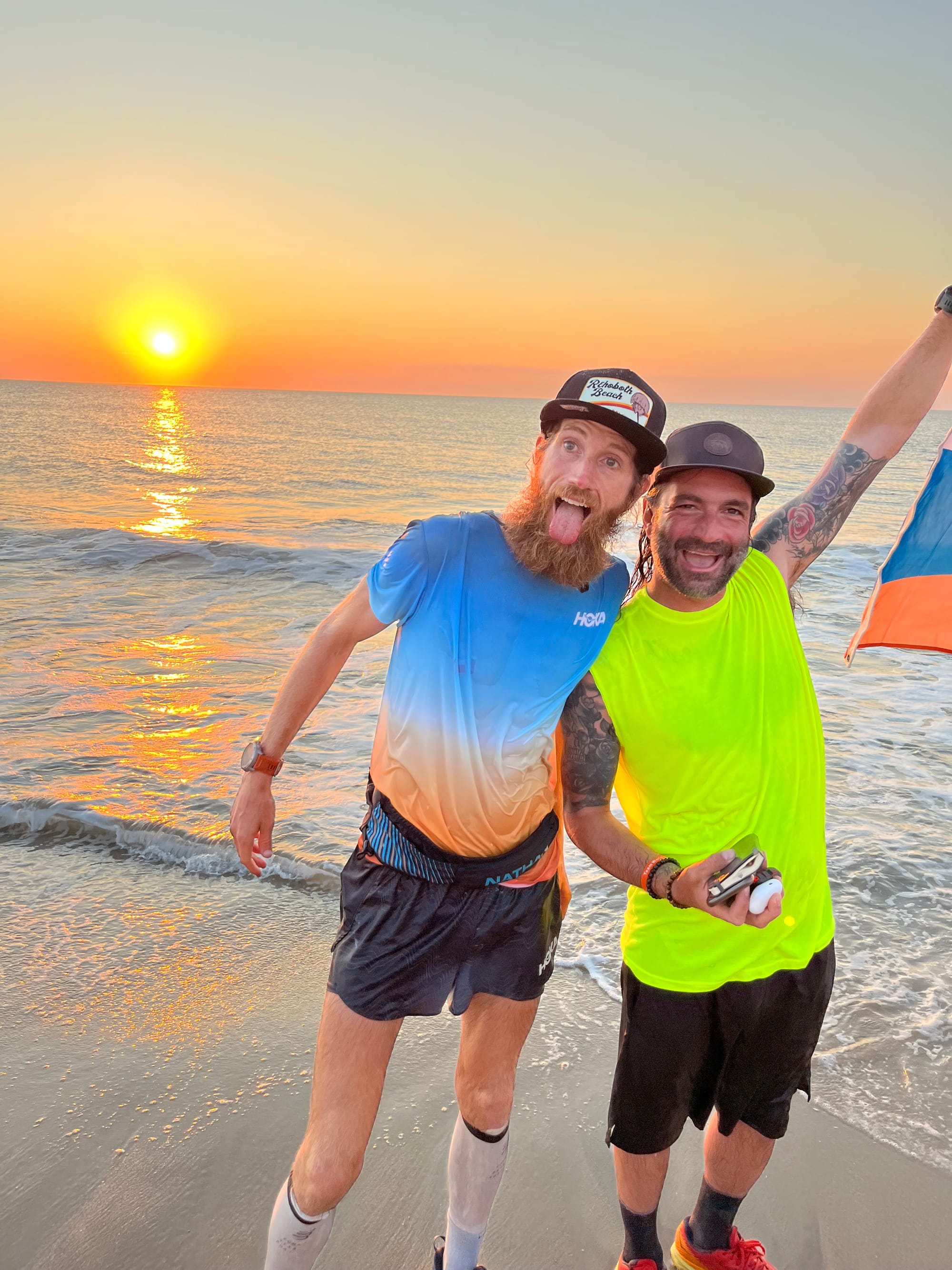
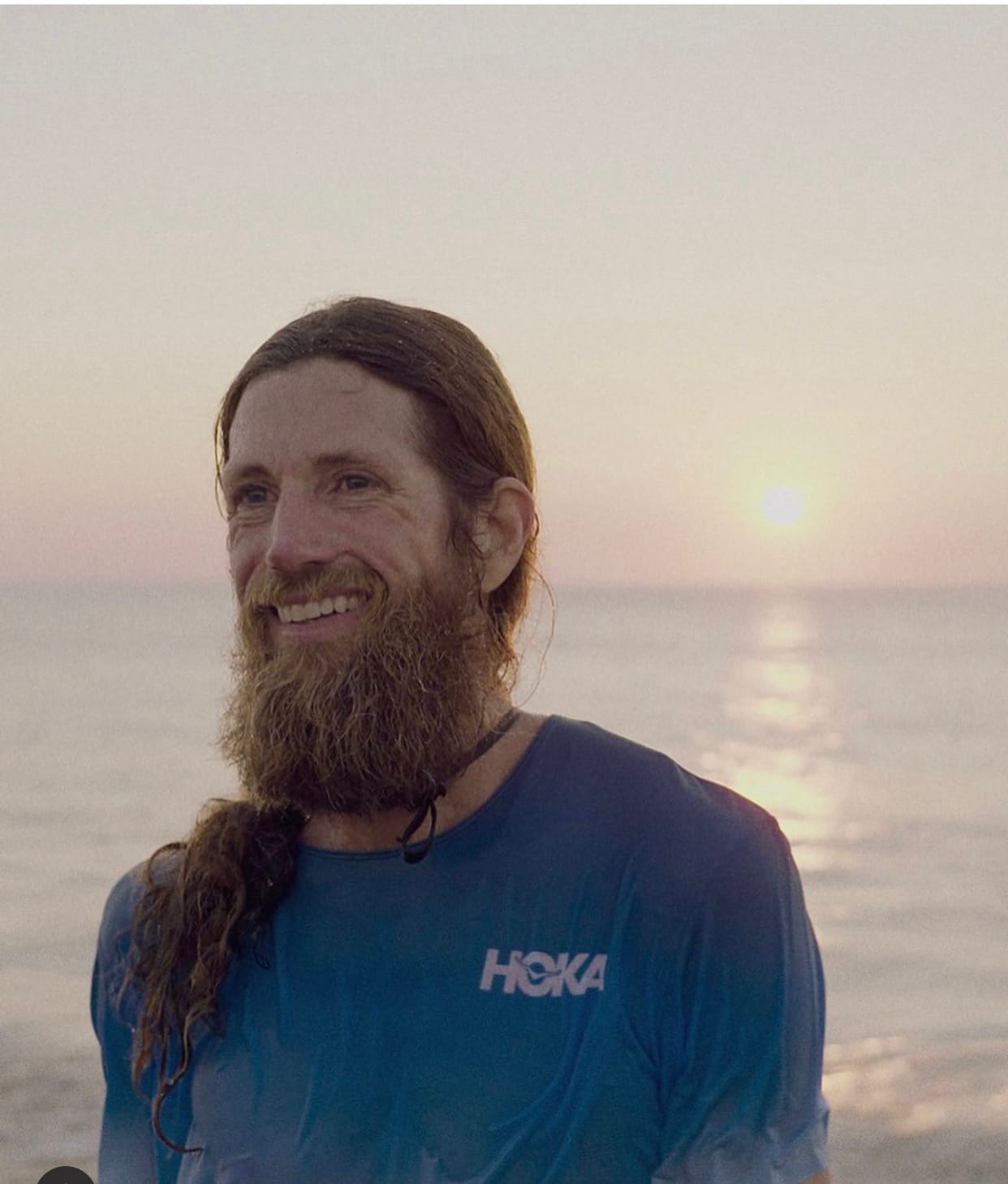
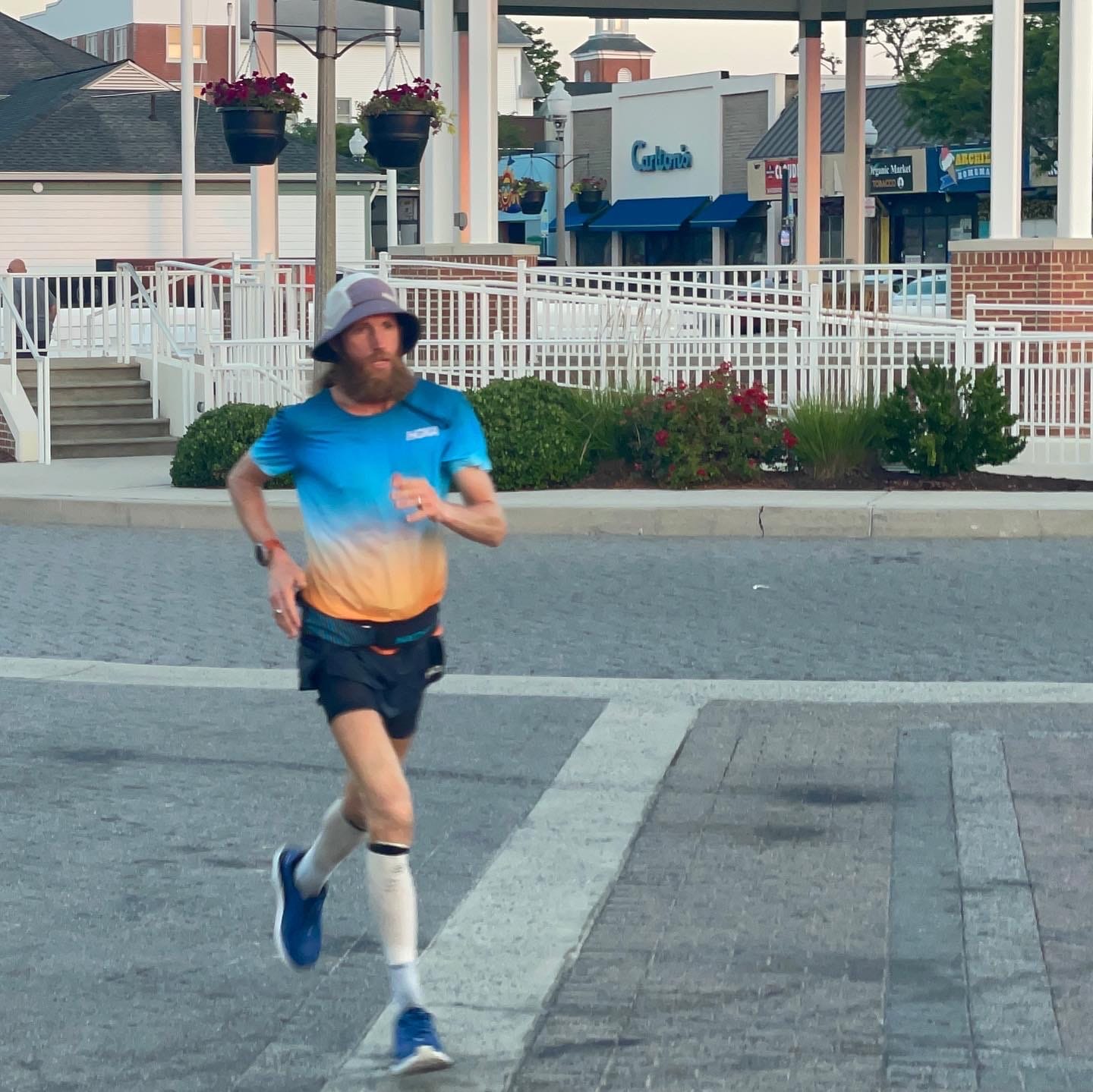
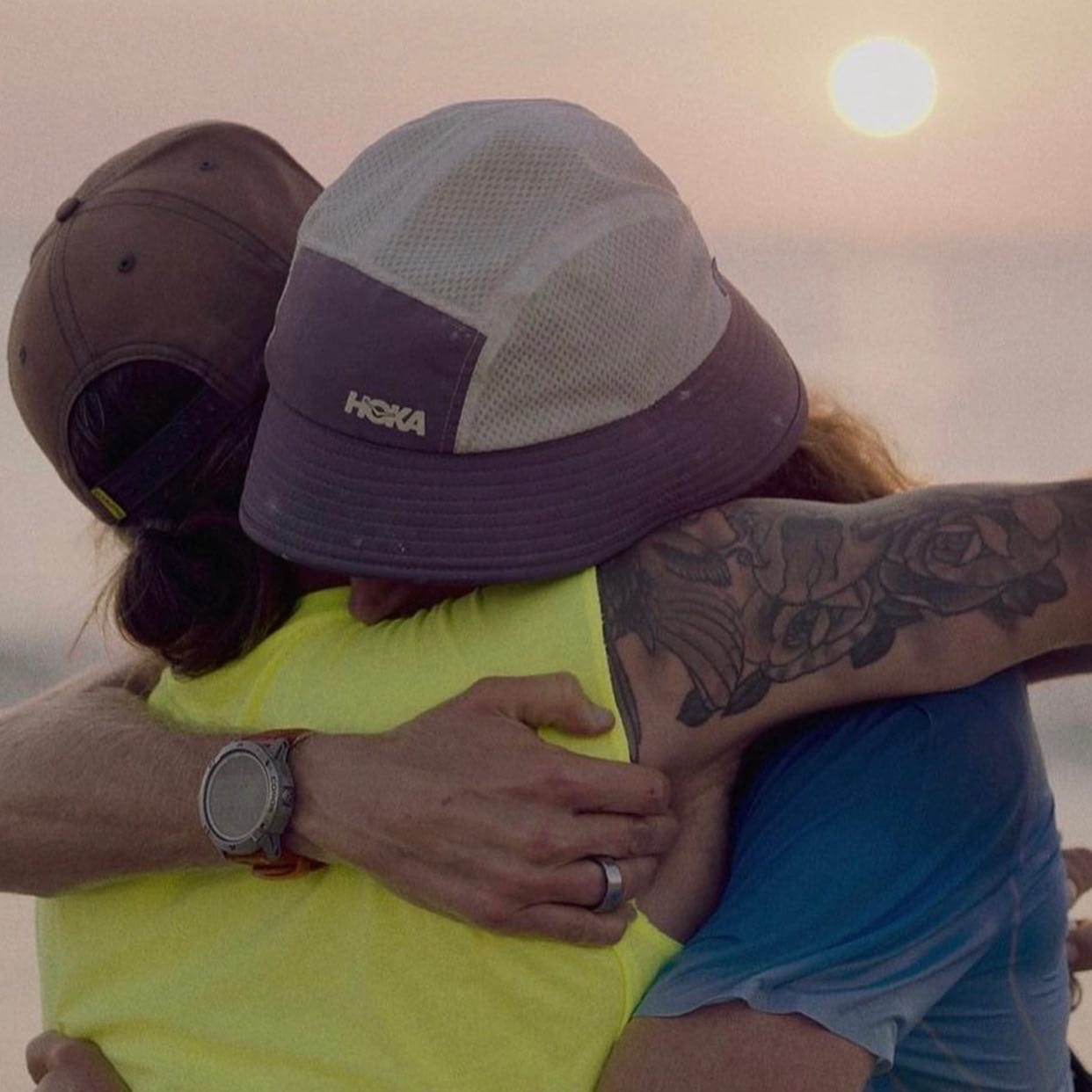
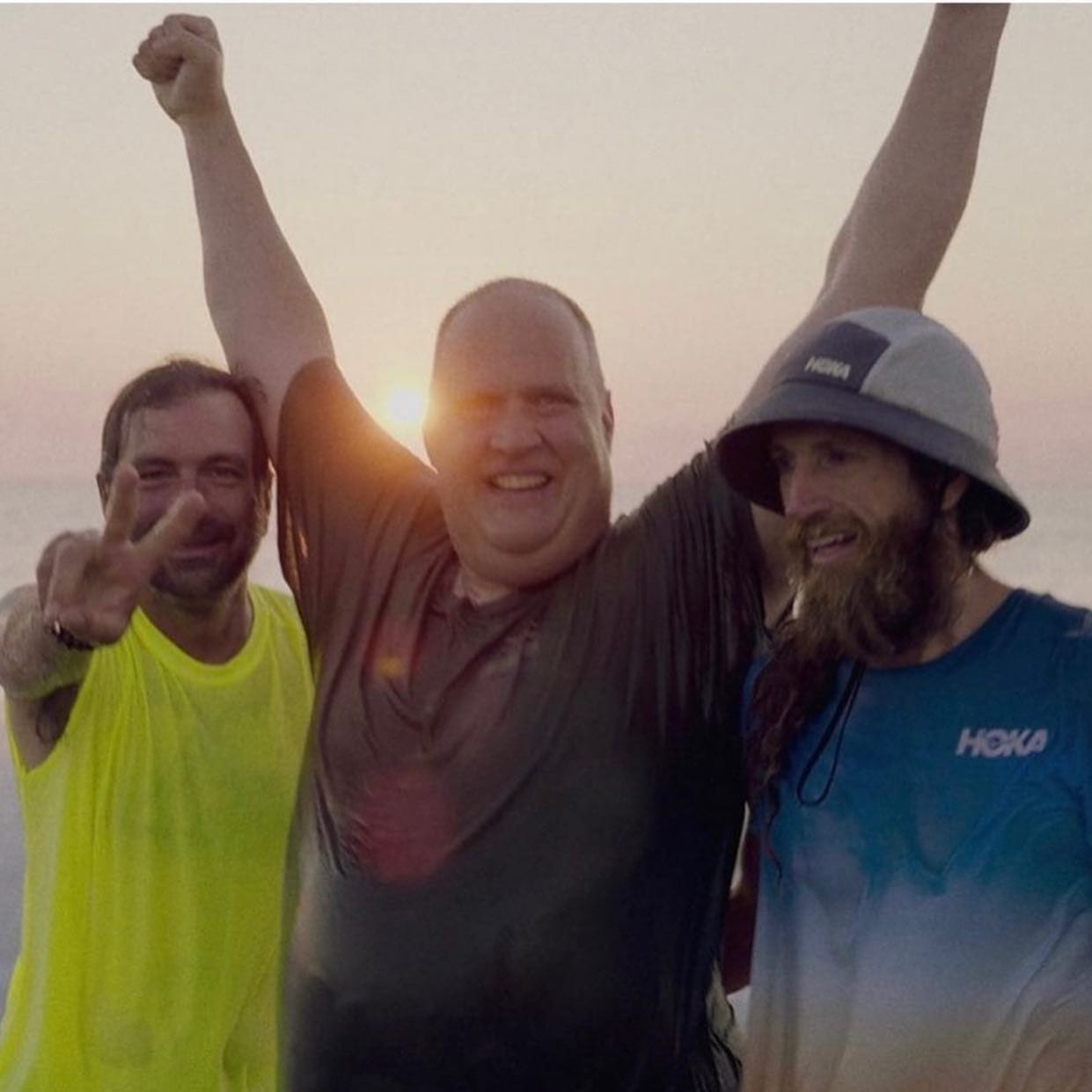
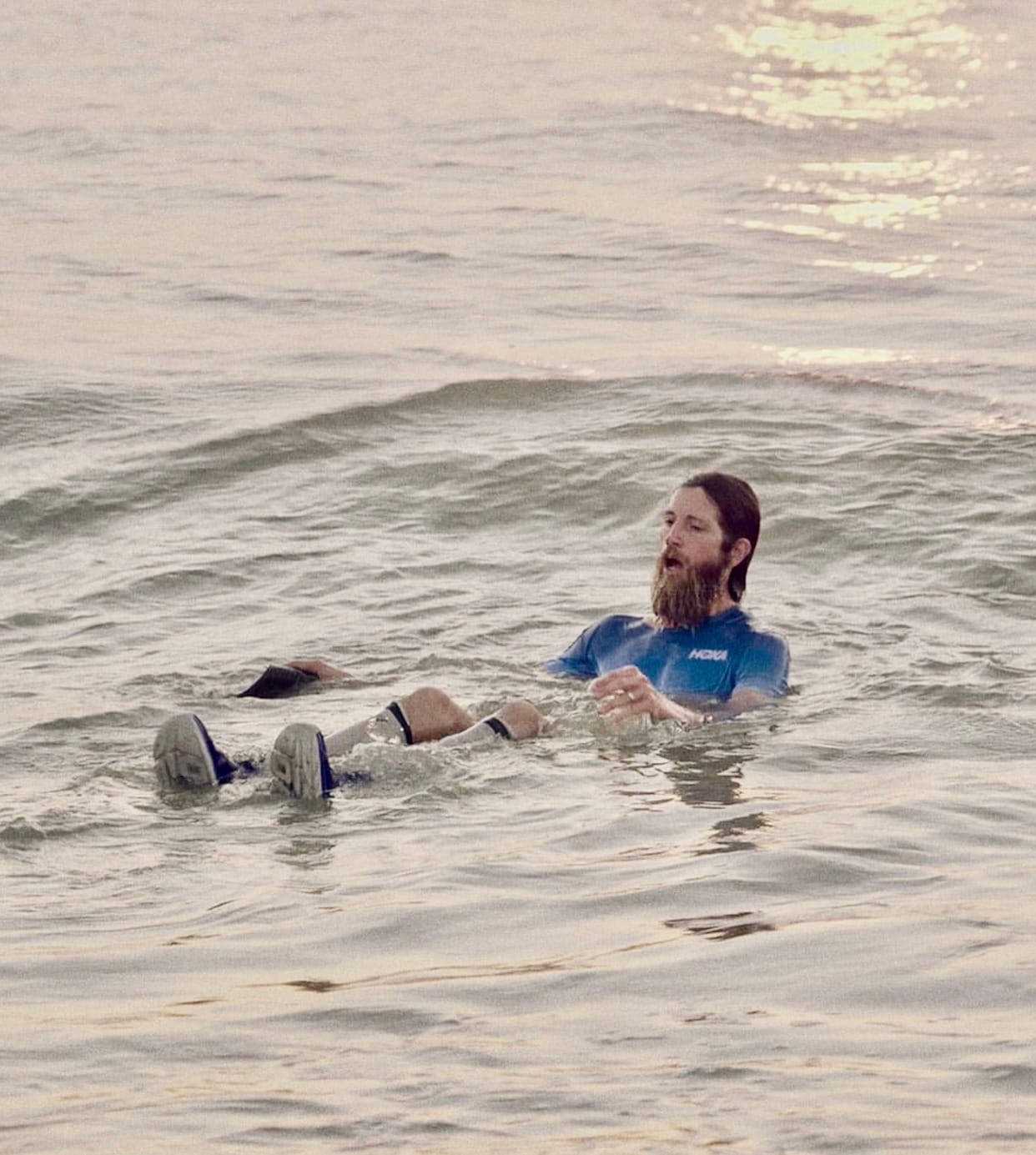
Michael Wardian finished his Running Home transcontinental run on July 1, 2022, in Rehoboth Beach, Delaware, joined by family and friends. He ended the run by diving into the warm waters of the Atlantic Ocean. [Photos courtesy of Michael Wardian]
As he logged miles, more and more people from across the country joined him — a pack growing so large it looked like a true Forrest Gumpian adventure to the finish line.
The next morning, on July 1, the orange sun painted a beautiful sky filled with blues and purples and oranges and reds as Wardian ran onto the beach and plunged himself into the warm water of the Atlantic Ocean as family and friends cheered. Wardian and Belz, his crew chief, hugged in the crashing waves, marking the end of a 3,200-mile journey.
Day 61: 104.12 miles. 2,815 feet elevation. 23 hours and 50 minutes. Conowingo, Maryland, to Rehoboth Beach, Delaware. We did it! … I just wanted to say Thank you 🙏, our community is strong and together we can do amazing things.
“I’m pretty tired,” Wardian posted on Instagram, quoting Forrest Gump. “I think I’ll go home now.”
What’s next for Michael Wardian? Subscribe to our twice-monthly newsletter to read about his plans for 2024, which includes attempting the fastest marathon while dressed as Forrest Gump.